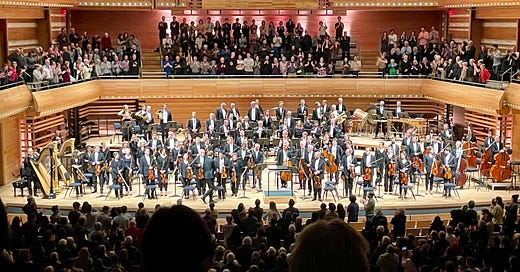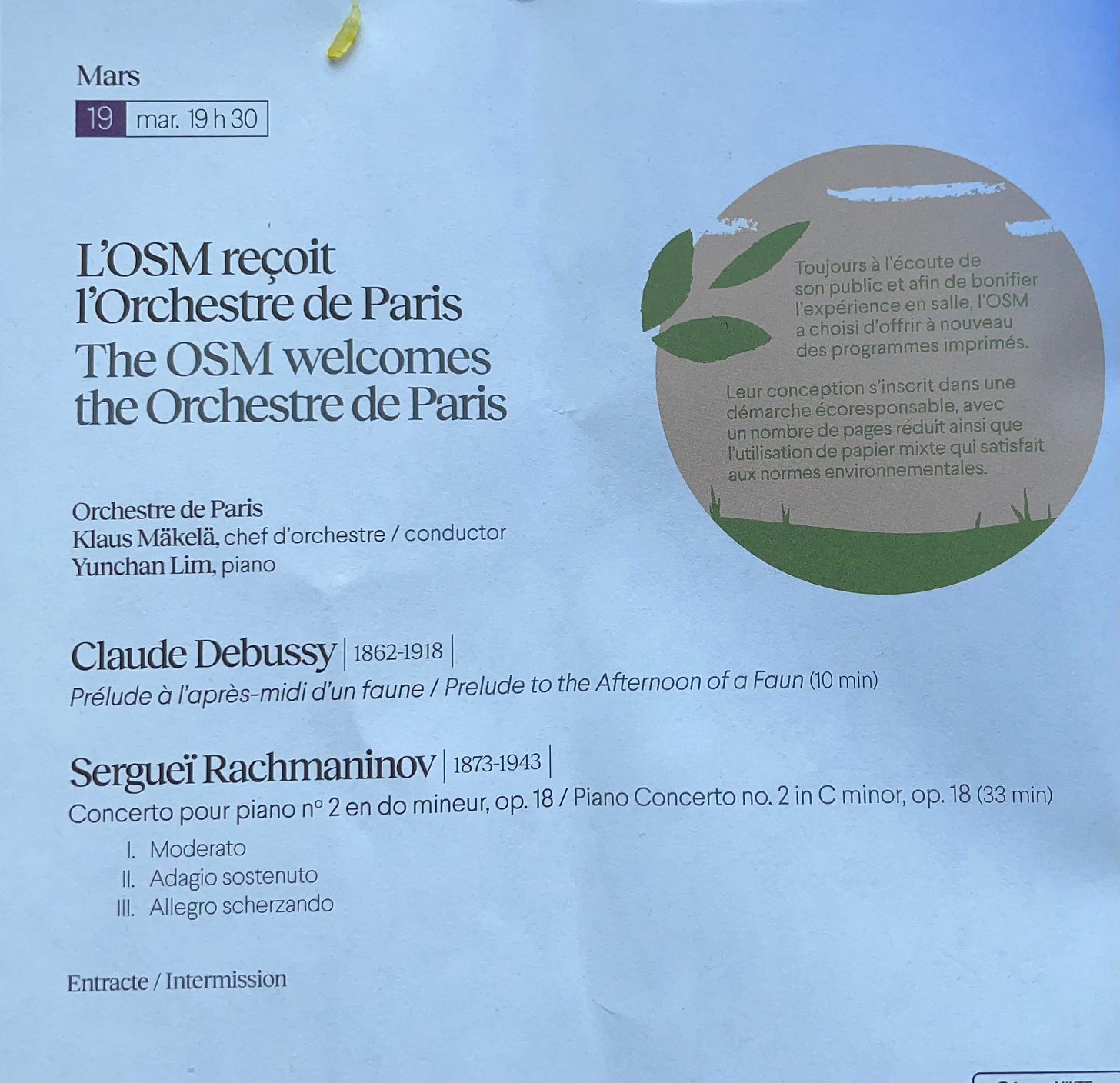l'orchestre de paris à montréal
is the concert hall a sacred space or a rallying point, or both?
Note: I modified the purpose of this newsletter as of April 6, 2024 to 'For those frightened by the ecological crisis and searching to heal our relations'. I also include the podcast version of this posting as a link in this main posting as opposed to a separate email (to reduce the volume of emails). You can also subscribe to 'calm presence' podcast on your favorite podcast player. Thanks Claude(podcast version link here)
I went to an Orchestre de Paris concert on March 19, 2024 present by the venerable Orchestre symphonique de Montréal (OSM) at la Maison symphonique (my first time there).
Always on the lookout for links between art and the ecological crisis, I noted that the OSM has a ‘Eco-Responsability Policy’ (Politique d’écoresponsabilité) on their web site, including commitments on impact measurement, environmentally responsable governance, staff eco-training, collaboration with green partners, sensitizing the public to eco-practices and so on.
This is commendable. Kudos also to the Conseil québécois des événements écoresponsables (CQEER) for their leadership, over many years, in shaping a culture of eco-responsibility in the arts sector in Québec. Applause!
However, as I sat in this magnificent wood laden temple of sound, the only tangible mention of our current poly-crisis that I could discern, was a brief mention in the program about ‘a reduction in the number of pages in the program’. Nothing else signalled a crisis.
Now one could argue that the concert hall is not the right place for ecological or humanitarian activism and that the concert hall (or art gallery for that matter) is a sacred space intended to reflect and regenerate, without the pressures of daily life.
Fair enough.
One could also argue that music itself is an act of resistance and engagement, as was the case with most of this orchestral concert’s offering from early 20th century European repertoire : Debussy’s Prélude à l’après-midi d’un faune, Rachmaninoff’s Piano Concerto no. 2 in C minor and Stravinsky’s L’oiseau de feu.
BTW, speaking of composers, I have a book recommending for you : Time's Echo: The Second World War, the Holocaust, and the Music of Remembrance by Jeremy Eichler which proposes ‘new ways of listening to history, and learning to hear between its notes the resonances of what another era has written, heard, dreamed, hoped, and mourned’ and profiles war and holocaust compositions by Richard Strauss, Arnold Schoenberg, Dmitri Shostakovich and Benjamin Britten. It’s a very good read. And for those who were not there on March 19, 2024, here’s an excerpt of ‘Rach No. 2’ with pianist Yunchan Lim in rehearsal with Orchestre de Paris, under the direction of Klaus Mäkelä, on March 6, 2024 :
Where was I…
Yes, my point here is that we can all do more in our artistic spaces, as both a refuge for reflection and a catalyst for action.
Here are a few suggestions:
What if… in addition to an land acknowledgement we heard a declaration of climate emergency before every concert in Canada. This is an idea that was discussed while I was with SCALE-LeSAUT, a network of artists, cultural practitioners, and arts organisations committed to addressing the climate emergency and environmental injustice.
What if… visiting artists, in particular those from former colonial powers, spoke before or after performances about their thoughts on decolonization and international climate justice?
What if… 1% or even .0001% of profits from arts events went to a local art and climate action group?
What if… we had a pre-concert conversation about cultural diplomacy and the value of the touring large ensembles with significant carbon footprints?
What if… a car sharing service was in place to reduce the carbon footprint of events by audiences (see Creative Green Canada for their carbon footprint measurement tools).
What if… (and this is a big one) we talked about how humanity as a whole needs to emulate the togetherness of a musical ensemble?
I don’t mean to pick on this particular orchestral concert - one in which I was complicit - but rather, my point is that we’re all in this together…
In fact, I was deeply moved by this concert : seduced by it’s exquisite beauty and puzzled by it’s apparent disconnection from reality.
Is the concert hall (or any arts event) a sacred space or a rallying point? Maybe it is both?
*
Please feel free to share your thoughts below or share this posting if you think it might be helpful to others.
BTW I’m publishing new episodes of both conscient podcast and balado conscient regularly on related topics. For example, this week I published e160 shannon litzenberger - a culture of collective thriving. You are welcome to subscribe and listen in, see conscient.









